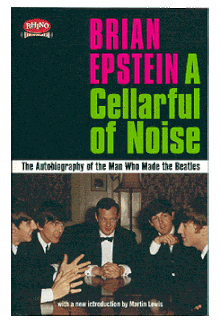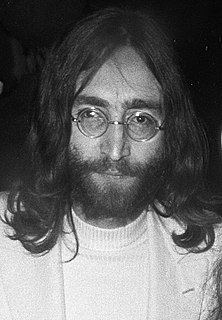
John Winston Ono Lennon was an English singer, songwriter, musician and peace activist who achieved worldwide fame as the founder, co-songwriter, co-lead vocalist and rhythm guitarist of the Beatles. Lennon was characterised by the rebellious nature and acerbic wit in his music, writing and drawings, on film, and in interviews. His songwriting partnership with Paul McCartney remains the most successful in history.

Randolph Peter Best is an English musician known as the drummer of the English rock band the Beatles immediately before the band achieved worldwide fame. Fired from the group in 1962 after playing drums as a Beatle for the previous two years in Germany and England, he started his own band, the Pete Best Four. He later joined and started many other bands over the years. He is one of several people who have been referred to as the Fifth Beatle.

The Beatles were an English rock band, formed in Liverpool in 1960, that comprised John Lennon, Paul McCartney, George Harrison and Ringo Starr. They are regarded as the most influential band of all time and were integral to the development of 1960s counterculture and popular music's recognition as an art form. Rooted in skiffle, beat and 1950s rock and roll, their sound incorporated elements of classical music and traditional pop in innovative ways; the band later explored music styles ranging from ballads and Indian music to psychedelia and hard rock. As pioneers in recording, songwriting and artistic presentation, the Beatles revolutionised many aspects of the music industry and were often publicised as leaders of the era's youth and sociocultural movements.

The fifth Beatle is an informal title that has been applied to people who were at one point a member of the Beatles or who had a strong association with John Lennon, Paul McCartney, George Harrison and Ringo Starr. The "fifth Beatle" claims first appeared in the press immediately upon the band's rise to global fame in 1963–64. The members have offered their own beliefs of the "fifth Beatle":
The Rutles were a rock band that performed visual and aural pastiches and parodies of the Beatles. This originally fictional band, created by Eric Idle and Neil Innes for a sketch in Idle's mid-1970s BBC television comedy series Rutland Weekend Television, later toured and recorded, releasing two albums that included two UK chart hits. The band toured again from 2002 until Innes' death in 2019.
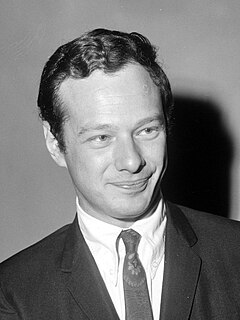
Brian Samuel Epstein was a British music entrepreneur who managed the Beatles from 1962 until his death.

Derek Taylor was an English journalist, writer, publicist and record producer. He is best known for his role as press officer to the Beatles, with whom he worked in 1964 and then from 1968 to 1970, and was one of several associates to earn the moniker "the Fifth Beatle". Before returning to London to head the publicity for the Beatles' Apple Corps organisation in 1968, he worked as the publicist for California-based bands such as the Byrds, the Beach Boys and the Mamas and the Papas. Taylor was known for his forward-thinking and extravagant promotional campaigns, exemplified in taglines such as "The Beatles Are Coming" and "Brian Wilson Is a Genius". He was equally dedicated to the 1967 Summer of Love ethos and helped stage that year's Monterey Pop Festival.

YannisAlexis Mardas, also known as Magic Alex, was a Greek electronics engineer who is best known for his close association with the Beatles. His nickname was given to him by John Lennon when he was involved with the group between 1965 and 1969, during which time he became head of Apple Electronics.
Apple Records is a record label founded by the Beatles in 1968 as a division of Apple Corps Ltd. It was initially intended as a creative outlet for the Beatles, both as a group and individually, plus a selection of other artists including Mary Hopkin, James Taylor, Badfinger, and Billy Preston. In practice, the roster had become dominated by the mid-1970s with releases of the former Beatles as solo artists. Allen Klein managed the label from 1969 to 1973, then it was managed by Neil Aspinall on behalf of the Beatles and their heirs. Aspinall retired in 2007 and was replaced by Jeff Jones.
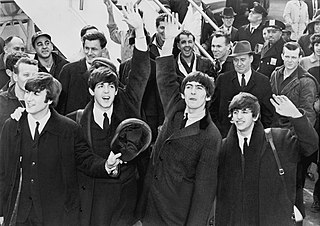
Beatlemania was the fanaticism surrounding the English rock band the Beatles in the 1960s. The group's popularity grew in the United Kingdom throughout 1963, propelled by the singles "Please Please Me", "From Me to You" and "She Loves You". By October, the press adopted the term "Beatlemania" to describe the scenes of adulation that attended the band's concert performances. From the start of 1964, their world tours were characterised by the same levels of hysteria and high-pitched screaming by female fans, both at concerts and during the group's travels. Commentators likened the intensity of this adulation to a religious fervour and to a female masturbation fantasy. Among the displays of deity-like worship, fans would approach the band in the belief that they possessed supernatural healing powers.

All You Need Is Cash is a 1978 television film that traces the career of a fictitious English rock group called the Rutles. As TV Guide described it, the group's resemblance to the Beatles is "purely – and satirically – intentional".
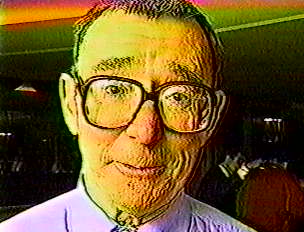
James Alistair Taylor was an English personal assistant of Brian Epstein, the manager of the Beatles. As an employee at Epstein's company NEMS, Taylor accompanied him when he first saw the Beatles perform, at the Cavern Club in Liverpool on 9 November 1961. Taylor subsequently worked as the group's so-called "Mr. Fixit", devising escape routes from crazed fans and assisting the band members in purchasing property. He later became general manager of Apple Corps but was fired soon after Allen Klein arrived to address the company's financial problems. Taylor published various memoirs of his years in the Beatles' employ, including Yesterday: The Beatles Remembered and With the Beatles.
Northern Songs Ltd was a limited company founded in 1963, by music publisher Dick James, artist manager Brian Epstein, and songwriters John Lennon and Paul McCartney of the Beatles, to publish songs written by Lennon and McCartney. In 1965, it was decided to make Northern Songs a public company, to reduce their income tax burden.
William Harry is the creator of Mersey Beat, a newspaper of the early 1960s which focused on the Liverpool music scene. Harry had previously started various magazines and newspapers, such as Biped and Premier, while at Liverpool's Junior School of Art. He later attended the Liverpool College of Art, where his fellow students included John Lennon and Stuart Sutcliffe, who both later performed with the Beatles. He published a magazine, Jazz, in 1958, and worked as an assistant editor on the University of Liverpool's charity magazine, Pantosphinx.
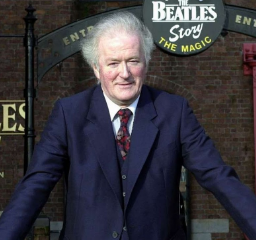
Anthony F. J. Barrow was an English press officer who worked with the Beatles between 1962 and 1968. He coined the phrase "the Fab Four", first using it in an early press release.
Cellarful of Noise was a short lived 1980s rock and New Wave pop band featuring Mark Avsec and Kevin Valentine, both members of Donnie Iris and the Cruisers. They released two albums. They also had one song hit the Billboard Hot 100, "Samantha ," which peaked at #69 in April 1988. They named themselves after Beatles manager Brian Epstein's biography book of the same name.
The original lineup of the Beatles, John Lennon, Paul McCartney, George Harrison, Stuart Sutcliffe and Pete Best regularly performed at different clubs in Hamburg, West Germany, during the period from August 1960 to December 1962; a chapter in the group's history which honed their performance skills, widened their reputation, and led to their first recording, which brought them to the attention of Brian Epstein.
The Cavern Club at 10 Mathew Street, in Liverpool was the venue where the Beatles' UK popularity started. John Lennon, Paul McCartney, George Harrison and Pete Best were first seen by Brian Epstein at the club. Epstein eventually became their manager, going on to secure them a record contract. Best was replaced by Ringo Starr on 16 August 1962, which upset many Beatles fans. After taunts of, "Pete forever, Ringo never!", one agitated fan headbutted Harrison in the club.
The English rock band the Beatles auditioned for Decca Records at Decca Studios in West Hampstead, north London, on 1 January 1962. They were rejected by the label, who instead opted to sign a contract with Brian Poole and the Tremeloes. The audition was recorded, and five of the songs—"Searchin'", "Three Cool Cats", "The Sheik of Araby", "Like Dreamers Do" and "Hello Little Girl"—were officially released on the Beatles rarities compilation Anthology 1 in 1995.

The Beatles: The Authorised Biography is a book written by British author Hunter Davies and published by Heinemann in the UK in September 1968. It was written with the full cooperation of the Beatles and chronicles the band's career up until early 1968, two years before their break-up. It was the only authorised biography of the Beatles written during their career. Davies published revised editions of the book in 1978, 1982, 1985, 2002 and 2009.
